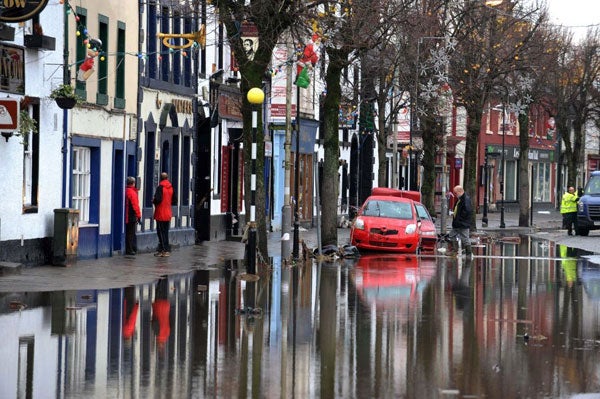After the freeze comes the thaw – and risk of a flood
Flood damage could end up costing you tens of thousands – and with a big thaw just round the corner it is crucial to be prepared.

Support truly
independent journalism
Our mission is to deliver unbiased, fact-based reporting that holds power to account and exposes the truth.
Whether $5 or $50, every contribution counts.
Support us to deliver journalism without an agenda.

Louise Thomas
Editor
Heavy rain and warmer temperatures this weekend will cause more damage to your home than the big freeze, experts warn. Snow and ice thaws will lead to floods and burst pipes.
Water damage to a home is horrendous – and expensive to put right. Esure says claims on its burst pipe insurance showed an average of £60,000-worth of damage each time. In many cases, burst pipes and the resulting escape of water brought down ceilings - causing extensive damage and losses throughout people's homes.
With around 300 gallons of water passing through a pipe in just 10 minutes it's clear that damage from a burst pipe can cause havoc very quickly. And with this week's big freeze, there's also the danger that burst pipes underground have gone undetected and will only be discovered when the thaw triggers a flow of water accumulated in the pipe.
Those living in flood plain areas could be at particular risk as the thaw could be speeded up by heavy rain, leading to rivers bursting their banks.
The Association of British Insurers says there are around two million homes at risk from coastal or inland flooding and around 200,000 homes at very high risk of flooding. Some say that as many as one in six homes are at risk.
When floods hit, water spreads quickly through homes, causing damage wherever it goes. But the pain can prove financially disastrous if you don't have adequate insurance.
The repair bill after the major floods across the country in 2007 topped £3bn, according to the ABI. Then areas in Yorkshire/Humberside and the West of England/Severn Valley regions were most badly hit. This time the damage could be much more widely spread.
More and more homes are being reclassified as being in a flood plain. Is yours? Got to the Environment Agencies' website at www.environment-agency.gov.uk/homeandleisure/floods/ and put your postcode into the Flood Map box.
The results can be frightening. Where I live in south-west London looks pretty safe for now, but those living across the Thames in Hammersmith and Fulham look decidedly at risk.
If you discover you are living in a flood risk area, you can bet your insurer knows, too. There will be one simple consequence of that: a massive hike in your premiums next time you renew.
If you've been unlucky enough to buy a property in the last few years in one of the many new housing developments built in areas of flood risk, you're already facing high insurance premiums or, worse, being refused cover altogether.
But if you're one of the millions who have cut back on home insurance to save money, you could be facing major problems if you don't arrange cover right away.
The ABI warns that around a fifth of homeowners have cancelled insurance policies due to the recession. Unless you have healthy savings, a flood or burst pipe could put you in a position where you won't be able to afford to replace damaged possessions and property.
If you have kept up your insurance payments, it's still worth digging out your policy to ensure you have the right cover. And when the time comes to renew, it could be even more crucial than ever to ensure you get what you need. Choosing insurance on price can end up being a costly mistake if it doesn't pay out when you need to claim.
It's not all bad news. There are many practical steps you can take to reduce the prospect of a flood causing catastrophic damage.
For starters, you should sign up for the Government's Floodline Warnings by calling Floodline on 0845 988 1188. The sooner you are aware of the danger, the quicker you can leap into action to protect your home.
There's a lots of advice at the Environment Agency's website, but things to do include ensuring that storm drains are clear of damage and debris and upgraded where necessary.
If there's a flood warning in your area it's worth investing in some sandbags to put at your door.
Other measures include using air brick covers which fit over ventilation bricks when flooding is imminent, while some can be fitted and left in place to operate automatically.
Fitting non-return valves to drains and water inlet and outlet pipes will also prevent waste water from flowing into your home during a flood.
Problems in the pipeline: How to avert trouble
To reduce the risk of a home emergency caused by a burst pipe, Gordon Hannah, director of claims at esure, advises:
* leave the central heating system on for short periods of time throughout the day and during the night, to avoid frozen pipes;
* remove the loft hatch from the roof space to allow warm air from the main house to enter;
* open doors to the sink unit to allow warmer air to circulate around the pipes;
* use only gentle heat, like bottles or towels soaked in warm water, if trying to thaw frozen pipes;
* find the stopcock and make sure it works;
* clear gutters and drains of any blockages. Make sure the gutter is not damaged due to the heavy snow falls.
Subscribe to Independent Premium to bookmark this article
Want to bookmark your favourite articles and stories to read or reference later? Start your Independent Premium subscription today.
Join our commenting forum
Join thought-provoking conversations, follow other Independent readers and see their replies
Comments